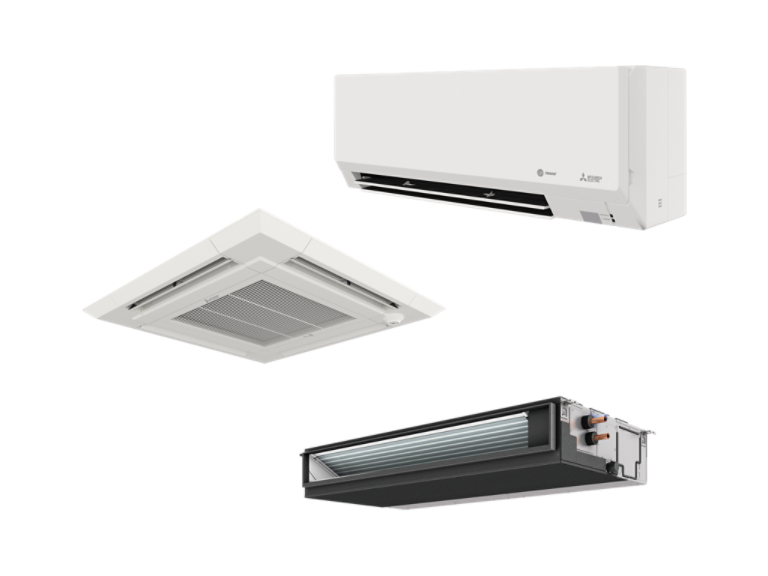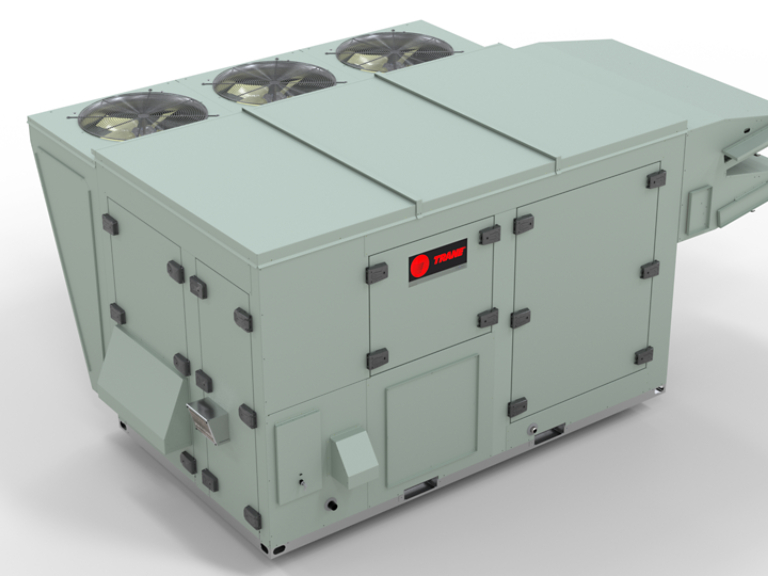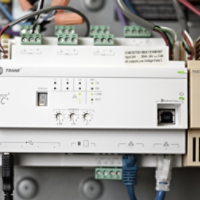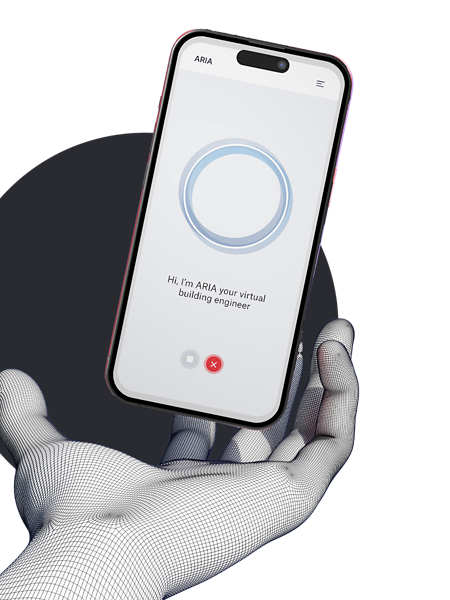- Hybrid Branch Controller (HBC): An electrically powered branch controller that enables hybrid operation by separating refrigerant and water distribution between system components.
- Water piping to individual zones: Indoor units are connected via piping that uses water rather than refrigerant, eliminating refrigerant exposure in occupied spaces.
- Variable-speed compressor technology: Inverter-driven compressors adjust capacity through variable-speed operation, helping to allow more energy use across load conditions.
- High-efficiency heat recovery: HVRF delivers energy efficiency with a two-pipe heat recovery design that transfers heat between zones for optimal performance and reduced energy use.
- Scalable design for complex buildings: Modular system architecture offers a flexible, scalable design that adapts to a wide range of building sizes and project requirements.
- Variety of indoor styles available: Compatible with multiple indoor unit styles to provide design options for different layouts and ceiling conditions.
- Seamless integration with control systems: Modular system architecture offers a flexible, scalable design that adapts to a wide range of building sizes and project requirements.
Overview
Hybrid VRF comfort, simplified safety.
Trane® / Mitsubishi Electric HVRF combines hybrid VRF flexibility with quiet operation and simple installation, using water instead of refrigerant in occupied spaces for future‑ready design.
- System Type: 100% electric heat recovery
- Compressor: Inverter-driven scroll compressor
- Refrigerant: R-410A
- Controls Integration: Compatible with Trane® / Mitsubishi Electric controls
-
Future-Ready Electrified Efficiency
A 100% electric, two-pipe heat recovery hybrid VRF system that combines refrigerant and water technologies for efficient, quiet performance, flexible zoning and a future-ready design.
-
Fewer Connections and Reduced Piping
HVRF’s two‑pipe design drastically reduces the number of connections, and the amount of piping required compared to traditional VRF or chiller systems. Fewer connections lower installation costs and minimize potential leak points.
-
Supports Code Compliance with A2L Refrigerants
By using water at the point of delivery, HVRF reduces the presence of refrigerant indoors, lowering the risk of exposure and helping you meet ASHRAE® 15 guidelines and A2L refrigerant charge limits.
-
Easier, Faster Installation
Factory-assembled HBC units and water piping with mechanical fittings simplify installation, help cut labor costs and eliminate the need for brazing or pressure testing.
-
Engineered to Meet Future Standards
By introducing interior water lines, HVRF reduces the amount of refrigerant in the overall system by up to 30% compared to conventional VRF. Fewer refrigerant lines (and less refrigerant) make compliance easier with current and future regulations.
-
Inherently Sustainable by Design
Energy-efficient HVRF delivers inverter-driven performance—helping to support sustainability goals without sacrificing comfort.
Product Information
-

- System Type: Heat recovery
- Compressor: Inverter-driven scroll compressor
- Refrigerant: R-410A transitioning to R32B in 2026
- Controls Integration: Compatible with Trane® / Mitsubishi Electric controls
- Standard Accessories: Base pan heater (depending on model), refrigerant sensors, safety controls
-

- System Type: Water-based indoor units
- Coil Type: Hydronic heat exchanger coil
- Controls Integration: Compatible with Trane® / Mitsubishi Electric controls
- Standard Accessories: Built-in condensate lift pump (varies by model), air filters (for ductless units)
Product Literature
FAQs
Your questions about Trane® / Mitsubishi Electric HVRF, answered.
HVRF stands for Hybrid Variable Refrigerant Flow. It’s called “hybrid” because it uses refrigerant between the outdoor unit and a Hybrid Branch Controller, then switches to water to condition the indoor spaces. This setup keeps refrigerant out of occupied zones while still allowing for VRF zoning and energy efficiency.
Traditional VRF systems deliver refrigerant all the way to each indoor unit. HVRF replaces that portion of the refrigerant loop with water, reducing the amount of refrigerant routed to occupied spaces. This lowers total system refrigerant volume, simplifies compliance with safety codes, and makes it easier to serve smaller zones.
Yes. Because HVRF keeps A2L refrigerant outside the occupied zones, it makes it easier to meet ASHRAE® 15 in occupancies considered institutional or where there are smaller physical zones.








